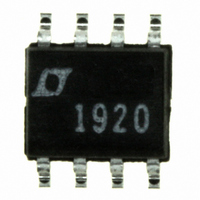LT1920CS8 Linear Technology, LT1920CS8 Datasheet - Page 10

LT1920CS8
Manufacturer Part Number
LT1920CS8
Description
IC PREC INSTRUMNTATION AMP 8SOIC
Manufacturer
Linear Technology
Datasheet
1.LT1920CN8PBF.pdf
(12 pages)
Specifications of LT1920CS8
Amplifier Type
Instrumentation
Number Of Circuits
1
Slew Rate
1.2 V/µs
Gain Bandwidth Product
1MHz
Current - Input Bias
500pA
Voltage - Input Offset
30µV
Current - Supply
900µA
Current - Output / Channel
27mA
Voltage - Supply, Single/dual (±)
4.6 V ~ 36 V, ±2.3 V ~ 18 V
Operating Temperature
0°C ~ 70°C
Mounting Type
Surface Mount
Package / Case
8-SOIC (3.9mm Width)
Lead Free Status / RoHS Status
Contains lead / RoHS non-compliant
Output Type
-
-3db Bandwidth
-
Available stocks
Company
Part Number
Manufacturer
Quantity
Price
Part Number:
LT1920CS8
Manufacturer:
LINEAR/凌特
Quantity:
20 000
Company:
Part Number:
LT1920CS8#PBF
Manufacturer:
Avago
Quantity:
13 500
Part Number:
LT1920CS8#PBF
Manufacturer:
LINEAR/凌特
Quantity:
20 000
Part Number:
LT1920CS8#TRPBF
Manufacturer:
LINEAR/凌特
Quantity:
20 000
APPLICATIONS
LT1920
THEORY OF OPERATIO
The LT1920 is a low power precision instrumentation
amplifier that requires only one external resistor to accu-
rately set the gain anywhere from 1 to 1000. The output
can handle capacitive loads up to 1000pF in any gain
configuration and the inputs are protected against ESD
strikes up to 13kV (human body).
Input Protection
The LT1920 can safely handle up to 20mA of input
current in an overload condition. Adding an external 5k
input resistor in series with each input allows DC input
fault voltages up to 100V and improves the ESD immu-
nity to 8kV (contact) and 15kV (air discharge), which is the
IEC 1000-4-2 level 4 specification. If lower value input
resistors are needed, a clamp diode from the positive
supply to each input will maintain the IEC 1000-4-2
specification to level 4 for both air and contact discharge.
A 2N4393 drain/source to gate is a good low leakage diode
for use with 1k resistors, see Figure 4. The input resistors
should be carbon and not metal film or carbon film.
RFI Reduction
In many industrial and data acquisition applications,
instrumentation amplifiers are used to accurately amplify
small signals in the presence of large common mode
voltages or high levels of noise. Typically, the sources of
these very small signals (on the order of microvolts or
millivolts) are sensors that can be a significant distance
from the signal conditioning circuit. Although these sen-
10
THERMOCOUPLE
10k
R
G
U
–
+
LT1920
INFORMATION
U
Figure 3. Providing an Input Common Mode Current Path
W
U
HYDROPHONE,
MICROPHONE,
U
ETC
200k
200k
R
G
sors may be connected to signal conditioning circuitry,
using shielded or unshielded twisted-pair cabling, the ca-
bling may act as antennae, conveying very high frequency
interference directly into the input stage of the LT1920.
The amplitude and frequency of the interference can have
an adverse effect on an instrumentation amplifier’s input
stage by causing an unwanted DC shift in the amplifier’s
input offset voltage. This well known effect is called RFI
rectification and is produced when out-of-band interfer-
ence is coupled (inductively, capacitively or via radiation)
and rectified by the instrumentation amplifier’s input tran-
sistors. These transistors act as high frequency signal
detectors, in the same way diodes were used as RF
envelope detectors in early radio designs. Regardless of
the type of interference or the method by which it is
coupled into the circuit, an out-of-band error signal ap-
pears in series with the instrumentation amplifier’s inputs.
–
+
LT1920
R
R
IN
IN
V
CC
J1
2N4393
Figure 4. Input Protection
V
CC
J2
2N4393
BIAS CURRENT RETURN
CENTER-TAP PROVIDES
R
G
OPTIONAL FOR HIGHEST
ESD PROTECTION
R
+
–
G
–
+
LT1920
V
V
CC
EE
LT1920
REF
1920 F04
OUT
1920 F03













